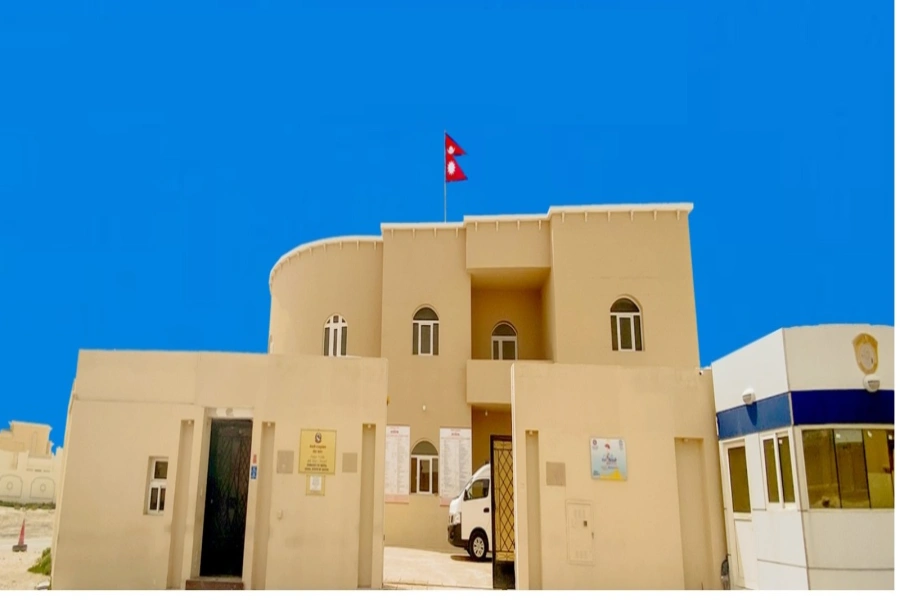CHITWAN, Sept 16: A Majhi couple, Bhola and Chhangurai from Khairahani Municipality-10 on Friday spent hours trying to catch fish and ghonghi (snails) in Budhi Gandaki River. By evening, they were able to collect around a kilogram for their dinner. At home, there had some rice and pulse to cook.
A tiny room whose roof is covered by ragged tarpaulin with a small area of it used as kitchen and another corner for bed. Other times, it is still fine to live here, but when it rains, it is challenging.
“Water leaks from roof. Also from the walls,” Chhangurai said. “We don’t have means to build a house. So, we have no choice,” she said.
The couple was were happy on Friday evening. Their catch of the fish and ghoghi was sufficient for them to make a bowl of curry. “It is our fortunate day, if we can have whole meal sometimes,” she added. The couple doesn’t get such delicious meal every day. Sometimes even if they gather ghoghi or fish from river, there are hardly any grains at home to cook.
Majhi community in the village has access to very limited resources. In a way, their lifestyle has not changed much. However, jungles and rivers, which is their means of livelihood, have shrunk over the years. Sometimes, days go without catching fish. Similarly, ghoghi gets equally scarce at times. ‘Fruits and vegetables in jungles and fields also disappoint them often’. “Some days go really unlucky. We have to sleep without any food,” reports Chhangurai.
Newly-built settlement for Musahars in Itahari unoccupied for t...

The lack of contacts and skills deprive them of other opportunities. Majhi as well as Musahar community, which also relies on jungle and river for livelihood, is hardly seen in and around construction sites.
“We are not given work there. We are treated differently,” Chhangurai said. “Others are trusted more than us. Even we don’t get that far in search of job, rather our men love to go to jungles and rivers to find food,” she added.
Musahar and Majhi communities have dilapidated house. They have no savings to invest for a new residence. Poverty continues to hit them hard. According to Bhola, children from his area hardly go to school. Education is not a priority in his community. “Education is not something we can afford. Even our children have born with the same fate. We are not in a condition to send them to school,” said the father of two boys. “Even if we send them to school, they drop midway. Amid piles of problems, children can’t continue studies,” he added.
Poverty has far fetching effects. Primarily, health facilities have always eluded the communities. Bhola states that the community members don’t have the habit of visiting hospital no matter how severely ill they are.
“We are not used to visiting doctors. We can’t spend money on such costly things,” he said. “We don’t get medicine from health post, they charge money there too, though it is said that medicine should be given free,” he added.
These two communities have another agony. They don’t have land in their name. And in lack of land certificate, they continue to be deprived of essential official documents which further deprives them of state facilities.
“We have been raising voice for land ownership certificate for a long time now. But this matter has not been settled yet,” said Bhola.
Also according to Lahan Majhi, the government has not yet responded to their problem of land. Though they have been assured time and again by political leaders for getting land, they are yet to get it, he said.
“We have five or 10 dhur of land, of one household. But that’s not ours officially. It has not been registered,” Lahan said.
Lahan also lamented of another problem. Fishing in river is not easy. Of late the government has even put a ban on it. “We are intimidated by the state. Even the security personals shoo us away if we are seen fishing,” said Lahan.
Lahan’s ancestors were dependent on Rapti and Budhi Gandki rivers for fishing. They would get plenty of food from those rivers, he shared. “Earlier generation did not face difficulties that we are facing nowadays. Those two rivers would avail them enough. But in our time, everything is so difficult,” he said.
Musahars and Majhis claim that they have reported of their pathetic conditions with authorities concerned many times but so far they have been not responded to.
“We reached out to many officials several times. We asked for plastics, to wrap our house, to fix roofs of our houses. They did not even provide that,” Lahan lamented. “They don’t allow us to fish freely. Nor do they care to build house for us or provide us any employment opportunities. We are bound to die starving if this continues,” he added.
Meanwhile, Lalmani Chaudhari, mayor of Khairahani Municipality stated that his office is working on a welfare program for the marginalized groups. “We are going to address their problem of settlement and livelihood,” he said.





































